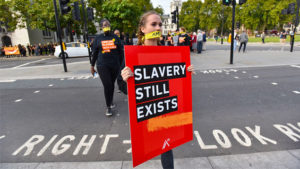Can philanthropy and business work together ?
7 min read
A common misconception is that it’s only big business that can afford to be philanthropic in the community. Although you’ll see plenty of high profile companies giving huge amounts of money to charities, it’s often the case that these are actually overshadowed by the number of much smaller companies supporting charities with a good deal less fanfare. It’s not about how much any given organisation gives back to the community through its Corporate Social Responsibility (CSR) activity. It’s about the involvement of that company and its staff in something outside work, that benefits others.
CSR in a company indicates an ethical and caring mindset which considers its employees, the environment and the wider community. It builds links between the company and the outside world and also enables employees to communicate outside the company with individuals or institutions. It shows that you consider sustainability and therefore recycle, minimise waste, use fuel wisely and monitor your activity for opportunities to improve.
This article summarises why you might wish to consider CSR in your company and also gives a case study from ExtraMile Communications – the author’s own business.
Why should your company consider CSR as part of their activity?
“All work and no play makes Jack a dull boy”, says the old adage and, while I’m not suggesting that CSR is play, it definitely can be fun. Engaging your team in something outside the four walls of the office or factory not only gives them a fresh challenge, it also brings their undoubted team skills into play for the benefit of other people.
Whether it’s taking part in a Fun Run, planning ways to save energy or to recycle waste, building and sailing dragon boats, painting rooms at the local hospice or simply visiting people in hospital, CSR activity can broaden the mind, expand horizons and give purpose to people’s lives.
What’s more, it gets your company name out there (if that’s what you want), with press coverage for larger events, social media post opportunities and it raises individuals’ and companies’ profiles with influencers who may be beneficial to your company’s future.
Most of all, it’s what makes communities tick. The involvement of people from outside the normal run of volunteers in a wide range of charitable and social enterprises gives freshness to those initiatives, and often leads to long-standing relationships that are not only satisfying, but also beneficial to individuals on both sides of the arrangement.
What’s the benefit of CSR to your company?
CSR is about your brand as much as it is about anything else. Your brand is not simply the image and colourways that underpin your logo. It’s your philosophy, your team, your attitude to business and to other people – it’s what you stand for. Good CSR policy within a company brings many rewards – here are few:
- PR opportunities and great stories – there’s a good deal of PR capital to be made of CSR, particularly if the activity is high profile. Frequently, the best opportunities of this sort are where a number of small companies work together for a larger project. All gain the benefit of a bigger story and the impact is that much greater. When individuals from companies participate in fundraising events, for example, there’s good social media material to be had, resulting in Twitter, Facebook, LinkedIn and Instagram posts that promote the individual, but by implication carry the company along too. Keeping up a story that starts with training, chronicles setbacks, monitors the entire event and then summarises the outcomes is very engaging for subscribers of newsletters and social media.
- Engaged staff with a sense of purpose – CSR can give your team something new to do that is not only a refreshing change but also helps build the resilience of the team. Whether it’s fighting against the odds in climbing a mountain for charity or painting the inside of a village hall, your employees will enjoy the camaraderie and your business will benefit from that engagement.
- Brand awareness – every time you publicise your activity; every time you make clear what you stand for; every time your company wins an award or accreditation, you build the brand. The brand as a whole is the picture that people have of you and the way you do business. The consequence of this is that you are likely to gain a competitive advantage because people like people with standards – they’ll buy from you.
- New relationships – CSR is also a great way to get involved with the wider community and meet new people, new influencers, people who may be good for your company. Business is all about relationships. People buy from people they know and trust and getting your company out there, getting it known by the right people, will simply just happen when you make steps to promote a comprehensive CSR policy.
- Ethical credentials – you cannot claim that you have an ethical company, simply by doing a bit of CSR. It’s about a whole raft of things that make your brand what it is (back to branding again!). Tied in with your environmental policy, the way you treat your staff and your business principles, engagement with the outside community is your brand in action – giving back and helping others who have less or who need support.
- Attract new recruits – people like to work for companies they trust and, if your brand says you care about people and the planet, you are more likely to attract good staff.
What sort of CSR activity will work for your company?
This very much depends on your company and what business you are in. If you’re a service company then, apart from what your staff can do, you can donate some of your services to organisations that need it – it doesn’t always have to be money! If you make things, then donating goods is always welcome or making special batches or packs for your favourite charity, donating gifts for auctions and raffles, or simply providing a discount to organisations that can prove their charitable status.
And you can donate time. This is probably the most valuable commodity, because, if you have a workforce and you can get volunteers, large jobs suddenly become small, impossible challenges suddenly become achievable. People’s time can be used for practical purposes such as building, decoration and repair, or it can be in fundraising challenges.
Underpinning all this, however, is the philosophy that drives your company. It’s about the way you do business, the values that you stand for and the principles that you stand by. CSR can also be participating in environmental work, getting accreditations or caring for and developing your staff. Everything contributes to the greater good.
How CSR has helped ExtraMile to play a key role in its community
It all started when we pitched our email marketing services to the local children’s hospice – The Donna Louise. They listened patiently and then asked if we would like to take the tour. It’s an incredible place – full of fun and light and as we went round, we saw what it was doing for the community in South Cheshire and Staffordshire. We donated our services. That was eight years ago and since then we’ve built several websites and campaign sites, provided email marketing services and participated in many fundraising events.
The two largest of these were undertaken by ExtraMiles’ Managing Director, Gabrielle Hadley. Firstly, she climbed Kilimanjaro with a view to raising £19,341 (the height of the mountain in feet). In the event, after the trek nearly killed her, Gabrielle raised over £20,000. We raised most of this through social media promotion, pointing to our website and to the JustGiving page.
The second made Kili seem like a cakewalk – Gabrielle was one of the captains in one of two teams of twelve people who tackled the Tower to Tower row: rowing from Tower Bridge to the Eiffel Tower, via Ramsgate, Dungeness, Eastbourne, Le Havre and then up the River Seine. The row took seven days and was continuous – two hours on, two hours off, twenty-four hours a day. This was an extreme challenge and the teams came from a variety of companies large and small in the area.

Tower to Tower raised around £300,000 in total. The publicity through blogs, social media and press coverage was massive, and the names of the crew members and their companies will forever be associated with that epic challenge. New business relationships were formed and people learned a good deal not only about others but also about themselves. This challenge not only involved Gabrielle, but also a significant input from the staff who built websites, maintained blogs and wrote content.
That activity has only been a part of how ExtraMile presents itself to the community at large. The company has been accredited for ISO 9001 (Quality), ISO 14001 (Environmental), ISO 27001 (Data security) and Investors in People Gold. It’s working hard to gain the Platinum IiP as well. The company presents itself as ethical, caring and involved in the community.
Since the last challenges, it has opened up its charitable activity to its staff to decide and currently the company is undertaking activity for other local charities, decided by the team.
ExtraMile has benefited significantly from the relationships, publicity and good will generated by its CSR activity. You can keep up to date with our CSR initiatives on the ExtraMile Communications blog.
Nick Evans
Nick Evans is Chairman of ExtraMile Communications, which he set up in 2000 with Gabrielle Hadley (Managing Director). ExtraMile is an international digital marketing agency that provides multilingual services in web design and development, email marketing, Search Engine Marketing and PR to companies large and small.
Previously, Nick was Head of Marketing for Apple Education and before that, had a career in sales and marketing after being a school teacher in the North East of England. He has a long history of working in and with technology, in education, in marketing and in business. He is a published author with titles in topics including business development, education software and, latterly, a venture into teen fiction.







